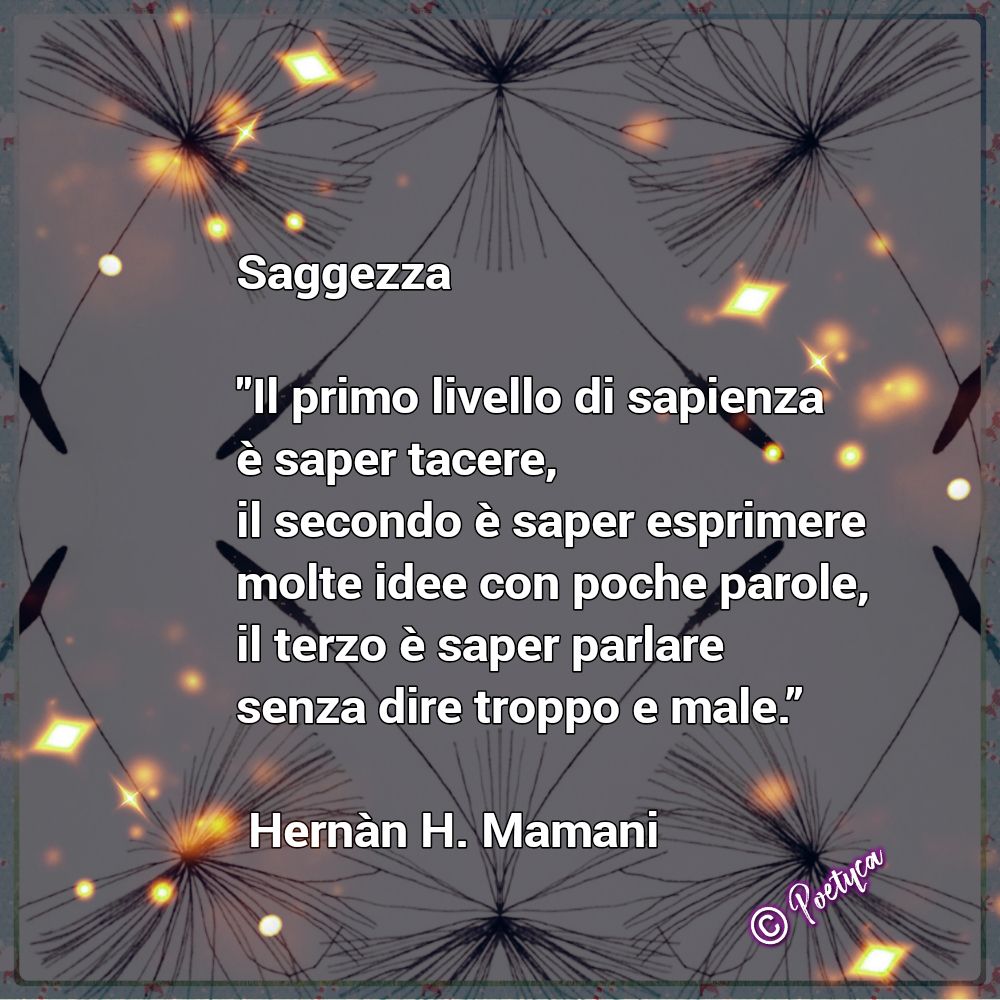
Chiamati all’amore
Ma a voi che ascoltate io dico:
Amate i vostri nemici, fate del bene a coloro che vi odiano.
(Lc 6,27)
Ti innamori? Ecco che ti ritrovi a guardare tutte le persone con un occhio diverso. Ti scopri generoso, pronto al perdono, o, in una parola, ” buono”, mentre forse prima eri inflessibile e meschino.
Inevitabilmente la gente che avvicini comincia anch’essa a reagire nella stessa maniera nei tuoi riguardi, e presto ti accorgerai di vivere in un mondo d’amore che tu stesso hai costruito.
Al contrario, pensa a quei periodi in cui ti sei trovato di cattivo umore, irritabile, meschino, sospettoso, fors’anche addirittura nevrotico. E in quei periodi hai constatato come la gente reagiva nei tuoi riguardi in maniera negativa e ti sei ritrovato a vivere in un mondo ostile, che però era stato creato dal tuo cervello e dai tuoi stati d’animo.
Quale comportamento adottare per creare un mondo felice, buono, pacifico? È necessario imparare questa semplice, bella ma faticosa arte: l’arte del “guardare”.
Ecco il metodo. Ogni qual volta ti senti stizzito, o invelenito contro qualcuno, non devi guardare quella persona, ma te stesso; la domanda da farti non è: ” Che cos’è che non va in questa persona? “, bensì: ” Questa mia irritazione che cosa mi dice di me stesso?”
Questa domanda comincia a fartela subito. Pensa a qualche persona che ti rende di malumore e ripeti a te stesso questa difficile, ma liberatrice frase: ” La causa della mia irritazione non sta in questa persona, ma in me “.
Dopo esserti detto questa frase, mettiti d’impegno a scoprire come tu stesso produci nel tuo animo questa irritazione. Innanzi tutto pensa a questo: che è effettivamente possibile che i difetti – o cosiddetti difetti – di quella persona ti infastidiscano proprio perché li hai anche tu, nascosti nel fondo di te stesso. Tu inconsciamente proietti negli altri questi tuoi difetti. Le cose stanno quasi sempre così, ma quasi nessuno arriva ad ammetterlo.
Cerca perciò nel tuo cuore e nel tuo inconscio i difetti che trovi in quella persona, e la tua irritazione verso di lei si trasformerà in gratitudine, perché il suo comportamento ti ha portato a scoprire un lato oscuro di te stesso.
C’è ancora un altro aspetto su cui è bene soffermarsi. Può darsi che tu ti senta urtato da ciò che quella persona dice o fa, perché le sue parole e il suo modo di fare mettono in luce qualcosa della tua vita, o di te stesso che tu rifiuti di vedere. Pensa all’imbarazzo che creano i mistici e i profeti: nessuno più è disposto a considerarli mistici o profeti quando ci sfidano con le loro parole o con la loro vita.
Un’altra cosa è chiara: tu ti senti urtato da quella persona, uomo o donna, perché non vive secondo le aspettative che ti sei formato dentro di te a suo riguardo.
Prima ipotesi: se tu hai qualche diritto a esigere che quell’uomo, o quella donna agiscano secondo i tuoi programmi (per esempio, quando si comportano in maniera ingiusta o crudele), non pensarci più. Se infatti vuoi cambiare quella persona nel suo comportamento, non saresti più efficace se non fossi irritato? L’irritazione infatti non fa altro che intorbidare la tua percezione e rende efficace il tuo intervento. Tutti sanno che quando uno sportivo (per esempio un pugile) perde la calma, la sua azione scade di qualità, perché la passione e la rabbia gli fanno perdere la concentrazione.
Seconda ipotesi: in molti casi, tu non hai alcun diritto di esigere che quella persona si comporti secondo le tue aspettative. Altri nella tua stessa situazione, di fronte a quello stesso comportamento, non ne sarebbero affatto irritati. Ripensa a questa verità, e la tua irritazione svanirà. Non è forse illogico da parte tua esigere che anche altre persone vivano secondo gli standard e le norme che i tuoi genitori hanno posto in te?
C’è infine un’ultima verità da considerare: visto l’ambiente che sta alle spalle di quella persona, viste le sue esperienze di vita, vista la sua assenza di consapevolezza, essa non può comportarsi in maniera diversa da come si comporta. È stato affermato con molta esattezza che conoscere tutto vuol dire perdonare tutti. Se tu conoscessi profondamente quella persona, tu la vedresti, semmai, come handicappata e non come degna di biasimo, e la tua irritazione svanirebbe immediatamente.
La prima cosa che sperimenterai sarà che tratterai quella persona, uomo o donna, con amore, ed essa risponderà con altrettanto amore, e tu ti troverai a vivere in un mondo d’amore che hai tu stesso creato.
da Chiamati all’amore – Anthony de Mello – Ed. Paoline
Called to love.
But I say to you who hear:
Love your enemies, do good to those who hate you.
(Luke 6:27)
You fall in love? Here you find yourself watching all the people with a different eye. Do you find generous, forgiving, or, in a word, “good”, while perhaps before you were tough and mean.
Inevitably, people approach also begins to react in the same way about you, and soon you’ll see live in a world of love that you yourself have built.
Instead, think of those times when you found yourself in a bad mood, irritable, mean, suspicious, perhaps even neurotic. And in those times you’ve seen how people reacted in a negative way about you and you found yourself living in a hostile world, but had been created by your brain and your mood.
What attitude to take to create a happy world, good, peaceful? You must learn this simple, beautiful but difficult art: the art of “watching”.
Here is the method. Whenever you feel angry, or invelenito against someone, you should not look at that person, but yourself, the question for you is: “What is wrong with this person? “But,” This thing tells me that my irritation with myself? “
This question begins to let it get away. Think of some person who makes you moody and repeat to yourself this difficult, but liberating words: “The cause of my irritation is not in this person, but in me.”
After you said this sentence, get commitment to yourself to find out how you produce in your mind this irritation. First of all think about this: that it is indeed possible that the defects – or so-called defects – that person bothers you because you have them too, hidden in the depths of yourself. You unconsciously projecting them in the other your faults. Things are almost always the case, but hardly anyone comes to admit it.
So look into your heart and in your unconscious that you find the flaws in that person, and your irritation towards her turn into gratitude, because his behavior led you to discover a dark side of yourself.
There is another aspect that is good to dwell. Maybe you feel offended by what that person says or does, because his words and his way of doing reveal something of your life, or yourself that you refuse to see. Think of the embarrassment that create the mystics and prophets, no one is willing to consider mystics or prophets when they challenge us with their words or their lives.
Another thing is clear: you feel offended by that person, man or woman, why not live up to the expectations you have formed inside of you to him.
First hypothesis: If you have any right to demand that this man, or woman, act in your own programs (for example, when you behave unjust or cruel), forget about it. In fact, if you want to change that person in his behavior, you would not be more effective if I were not angry? The irritation does not do anything but muddy your perception and makes your effective intervention. Everyone knows that when an athlete (for example, a boxer) lose your temper, his action expires on quality, because the passion and anger make him lose concentration.
Second hypothesis: In many cases, you have no right to expect that person to behave according to your expectations. Others in your same situation, facing the same behavior, it would not at all irritated. Think back to this truth, and your irritation will disappear. Is it not unreasonable of you to demand that other people live by the standards and rules that your parents have placed in you?
There is one last truth to consider: Having regard to the environment that is behind that person, given his experience of life, given his lack of awareness, it can not behave differently from how it behaves. It has been argued with great accuracy all know that it means to forgive all. If you knew that person deeply, you’d see the, if anything, such as disabled and not as worthy of blame, and your irritation would vanish immediately.
The first thing you will experience that will treat that person, man or woman, with love, and it will respond with equal love, and you find yourself living in a world of love that you have created yourself.
Called to love – Anthony de Mello – published by Pauline Press




























Devi effettuare l'accesso per postare un commento.